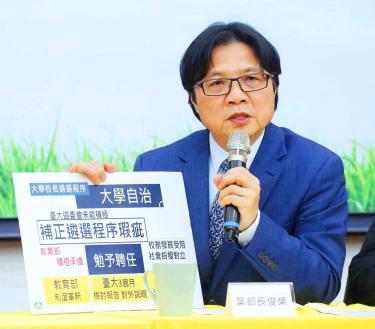Kuan Chung-ming, finally be the president of NTU
Following a year of controversy over Kuan Chung-ming appointment, the Taiwan Ministry of Education held a press conference to announce its decision Monday, Dec. 24.

Education Minister Yeh Jiunn-rong (葉俊榮) announced Monday that the ministry has reluctantly agreed to the appointment of Kuan Chung-ming (管中閔) as National Taiwan University (NTU) president, ending a nearly year-long standoff.
Kuan was elected as NTU president on Jan. 5 to take over the seat left vacant by former NTU President Yang Pan-chyr (楊泮池), who chose not to serve another term at the university when his term expired in June last year.
Though Education Ministry approval of elected university presidents is normally routine, it declined to confirm Kuan’s appointment by the Feb. 1 deadline, citing conflict of interest in the selection process and other possible violations of existing regulations.
It said there was an undisclosed conflict of interest between Kuan and Taiwan Mobile Co. Vice Chairman Richard Tsai (蔡明興), as Kuan was an independent director on Taiwan Mobile’s board while Tsai was on the 21-member NTU committee that elected the university’s president.
Critics of the Democratic Progressive Party (DPP) government’s move saw it as politically motivated, however, arguing that the DPP opposed Kuan because of his association with the opposition Kuomintang (KMT).
Kuan served in the KMT administration unseated by the DPP in 2016 as its chief economic planner from February 2013 to February 2015.
The ministry in April asked the university to restart the presidential selection process, but the university refused and filed an administrative appeal asking that the ministry honor the election results and appoint Kuan, leaving the ministry and the university stalemated on the issue.
Two education ministers, Pan Wen-chung (潘文忠) and Wu Maw-kuen (吳茂昆), have resigned over the controversy, and NTU has not named an alternative candidate for the post of president.
The DPP government’s change in position comes after it suffered a major defeat in Taiwan’s elections for local government offices on Nov. 24, winning control of only six of Taiwan’s 22 cities and counties, down from 13 previously.













